

Artykuły

The article presents the concept of epistemic injustice developed by Miranda Fricker (2007, 2017). The term refers to instances in which an individual is assigned an inferior epistemic position and thus is at risk of non-epistemic mistreatment. Fricker discusses testimonial injustice (subconsciously seeing someone as less credible) using the example of Simone de Beauvoir and Jean-Paul Sartre. Hermeneutical injustice, which is described as either a gap in knowledge or a harmful interpretation in the collective imagination, is exemplified by sexual harassment and homosexuality. One of the major critiques and developments of the concept of hermeneutical injustice was presented by Arianna Falbo (2022). She argues that the sources of hermeneutical injustice are not limited to gaps in knowledge but also a plethora of misleading concepts which cover up and overpower better concepts. Thus, the mere presence of appropriate concepts is not enough, the absence of harmful concepts is also necessary. The author claims that modifying the concept of epistemic injustice as proposed by Falbo explains why the existence of a nonbinary gender category in the German legal system was not sufficient to reject the binary gender system. Finally, the author discusses an analogous concept of epistemic disobedience from decolonial philosophy1. These discussions result in the claim that epistemic errors, overlooking certain experiences and/or usurping objectivity are the basis of unintentional discrimination.
Barnes E., The Minority Body: A Theory of Disability, Oxford 2016.
Beauvoir S. de, Pamiętnik statecznej panienki, tłum. H. Szumańska-Grossowa, Warszawa 2002.
Bourdieu P., Męska dominacja, tłum. L. Kopciewicz, Warszawa 2004.
Briggle A. Which Reality? Whose Truth? A Review Kathleen Stock’s Material Girls: Why Reality Matters for Feminism, „Social Epistemology Review and Reply Collective” 10 (2021), nr 11, s. 52–59, https://wp.me/p1Bfg0-6jf (dostęp: 1.03.2024).
Brownmiller S., In Our Time: Memoir of a revolution, New York 1990.
Butler J., Uwikłani w płeć, tłum. K. Krasuska, Warszawa 2008.
Butler J., Koniec różnicy seksualnej?, [w:] Gender. Przewodnik Krytyki Politycznej, tłum. A. Kowalcze-Pawlik, Warszawa 2014, s. 70–91.
Collins P.H. Black Feminist Thought, New York 1990.
Doan M., Resisting Structural Epistemic Injustice, „Feminist Philosophy Quarterly” 4 (2018), nr 4, s. 1–23.
Dotson K., A cautionary tale: On limiting epistemic oppression, „Frontiers: A Journal of Women Studies” 33 (2012), nr 1, s. 24–47.
Dular N., Mansplaining as Epistemic Injustice, „Feminist Philosophy Quarterly” 7 (2021), nr 1, s. 1–23.
Falbo A., Hermeneutical Injustice: Distortion and Conceptual Aptness, „Hypatia” 37 (2022), nr 2, s. 343–363, https://doi.org/10.1017/hyp.2022.4.
Fanon F., Czarna skóra białe maski, tłum. U. Kropiwiec, Kraków 2020 (oryginał opublikowany w 1952).
Fricker M., Epistemic Injustice: Power and the ethics of knowing, Oxford 2007.
Fricker M., Evolving concepts of epistemic injustice, [w:] Routledge Handbook of Epistemic Injustice, I.J. Kidd, J. Medina, G. Pohlhaus, Jr. (eds), New York 2017.
Knopf K., Introduction: Postcolonial Knowledges, „Postcolonial Interventions” 6 (2022), nr 1, s. 14–37.
Koertge N., How Might We Put Gender Politics into Science?, „Philosophy of Science”, 71 (2004), nr 5, s. 868–879.
Mignolo W.D., Epistemic Disobedience, Independent Thought and De-Colonial Freedom, „Theory, Culture & Society” 26 (2009), nr 7–8, s. 1–23.
Mills Ch.W., Ideology, [w:] Routledge handbook of epistemic injustice, I.J. Kidd, J. Me- dina, G. Pohlhaus, Jr. (eds), New York 2017, s. 100–111.
Roughgarden J., Evolution’s Rainbow. Diversity, Gender, and Sexuality in Nature and People, Berkeley 2009.
Pohlhaus G., Relational knowing and epistemic injustice: Toward a theory of willful hermeneutical ignorance, „Hypatia” 27 (2012), nr 4, s. 715–35.
Seredyńska A., W stronę profilaktyki wykorzystywania seksualnego małoletnich w Kościele, „Studia Paedagogica Ignatiana” 22 (2019), nr 3, s. 191–196.
Seksualne wykorzystywanie małoletnich w Kościele. Problem — odpowiedź Kościoła — doświadczenie polskie, A. Żak, E. Kusz (red.), Kraków 2018.
Stock K., Material Girls: Why Reality Matters for Feminism, Boston 2021.
Stone A., An Introduction to Feminist Fhilosophy, Cambridge, UK 2007.
Tobi A., Epistemic Injustice and Colonisation, „South African Journal of Philosophy” 41 (2022), nr 4, s. 337–346.
Wiredu K., Introduction: African Philosophy in Our Time, [w:] K. Wiredu, A Companion to African Philosophy, Malden-Oxford 2004, s. 1–27.
Wodziński M., Moskalewicz M., Mental Health Experts as Objects of Epistemic Injustice — The Case of Autism Spectrum Condition, „Diagnostics” 13 (2023), nr 927, s. 1–14.
Ziemińska R., The Epistemic Injustice Expressed in ‘Normalizing’ Surgery on Children with Intersex Traits, „Diametros” 17 (2020), nr 66, s. 52–65, doi: 10.33392/diam.1478.
Ziemińska R., Epistemiczna niesprawiedliwość i chirurgia „normalizacyjna” u dzieci z cechami interpłciowymi, „Filozofia w Praktyce” 6 (2020), nr 1–4, doi: 10.26106/k474-vv10.
Ziemińska R., Intersex newborns and people with nonbinary gender identity: The beginning of legal recognition, „Studia Iuridica” 90 (2021), s. 236–250, doi: 10.31338/2544-3135.si.2022-90.14.
Ziemińska R., Niebinarne i wielowarstwowe pojęcie płci. Próba inkluzji danych o osobach interpłciowych i niebinarnych, Warszawa 2018.
Ziemińska R., Teoria feministyczna a niebinarne pojęcie płci, „Avant” 11 (2020), nr 3, doi: 10.26913/avant.2020.03.11.
Ziemińska R., Toward a Nonbinary Model of Gender/Sex Traits, „Hypatia” 37 (2022), nr 2, 402–421, https://doi.org/10.1017/hyp.2022.10.